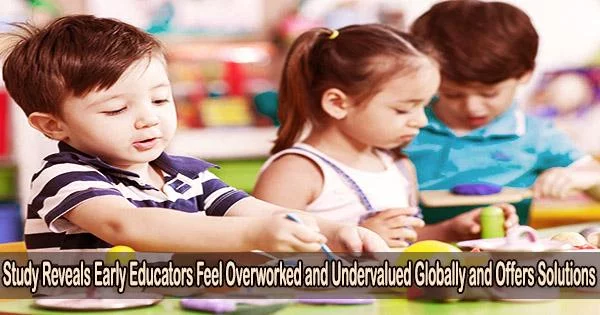An interim report has been made available by the early childhood education royal commission in South Australia, which is chaired by Julia Gillard. The main suggestion is that all three-year-olds (in a move similar to other states) attend preschool. The early education workforce, however, is one of the crucial factors surrounding this transformation, according to the report.
SA’s report comes as the Productivity Commission begins a wide-ranging inquiry into early childhood education and care in Australia.
As part of this, the commission is looking at the workforce. We already know that early childhood instructors experience significant rates of burnout and turnover. People find it challenging to establish a stable career in the industry as a result. Additionally, it makes it more difficult for services to hire employees and for families to locate childcare facilities for their kids.
Our new research looks at why early childhood educators are burning out and how we can fix this.
Educator turnover
Since the start of the epidemic, the topic of burnout in early education has gotten more attention than it has in other crucial industries.
A 2021 a union survey of 4,000 educators revealed 73% planned to leave the sector within the next three years due to excessive workload, stress, low pay and status, lack of professional development and career progression.
It also found 82% “always” or “often” felt rushed when performing key caring tasks in the past month.
As of, 2022, educator job advertisements had doubled since the pandemic.
What is burnout?
Burnout is complex and can involve many things, including:
- ongoing physical and mental fatigue
- low sense of personal achievement
- emotional exhaustion
- depersonalization, where you feel separate from your body or true feelings.
Burnout is important because it negatively affects educators’ health, the caliber of children’s education, causes educators to leave the profession, which then affects parents’ ability to work (particularly women) and the success of businesses.
Our new study
We wanted to understand what causes educator burnout, with the aim of helping policymakers and governments plan better support for the sector.
To do this, we reviewed 39 studies about the drivers of early childhood educator burnout from 13 countries, including Australia.
A “systematic review” is a type of study that is effective at summarizing all of the information that is currently available on a subject.
What leads to burnout?
We found educator burnout can be driven by a range of factors.
Certain personal circumstances make an educator more likely to experience burnout. For instance, people who have more family responsibilities or lower household income report feeling more burned out. This category includes those who are single, widowed, divorced or separated.
Younger, less experienced educators were particularly vulnerable to depersonalization. Male educators were more likely to experience burnout than their female colleagues.
Educators cited poor mental health, in particular despair and emotional suffering, as a major factor in their burnout. Less likely to experience burnout were instructors who were more socially engaged and who received support from friends, family, and/or their faith.
How services treat staff matters
More educators from services with a weak or nonexistent emphasis on well-being reported burnout.
This included access to programs with limited emotional support techniques such peer debriefing or counseling or coaching. These services also demonstrated a disregard for the work-life balance of educators by requiring them to work additional unpaid hours or by being rigid about leave for personal reasons.
Educators discussed the fatigue caused by “surface acting,” where they had to pretend they were (or were not) experiencing certain emotions to please children, staff and parents. For instance, a teacher may be feeling overwhelmed and fatigued from their workload but still having to put on a positive, upbeat attitude when interacting with kids and families.
Poor professional relationships were associated with feelings of stress. This included feeling undermined by parents, teaching children with behavioral challenges, and negative relationships with colleagues and directors.
Funding and status
According to our research, educators become stressed when they are under pressure to provide kids with “quality” learning environments and experiences despite having minimal resources.
Some tasks, such as continuously attempting to demonstrate to authorities that they were rendering a “quality” service by gathering data, were more likely to result in tiredness.
Inadequate income can push educators to leave their positions. It can also lead to reduced motivation, and increase the number of sick days.
Burnout among educators was also associated with a sense of low social standing. If they taught younger children or had worked in the field for a long period, this was more obvious.
Both groups reported being affected by a lack of professional development and opportunities for promotion.
How can we reduce burnout?
According to our review, there are several practical approaches to enhance educators’ wellbeing, avoid burnout, and maintain them in their positions.
These include counseling so they have a safe place to express their emotions while reflecting on their job, peer mentorship so they know they are not alone, and coaching so educators may get feedback and advance their careers.
If we want to keep educators in these vital roles we need to actively support them to stay.
















